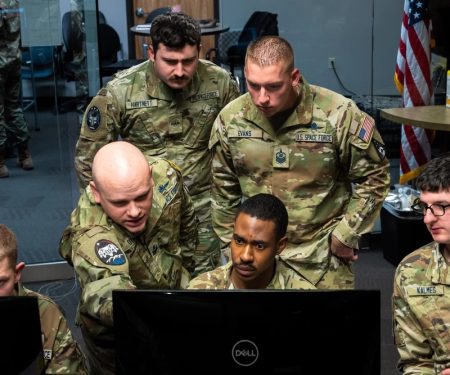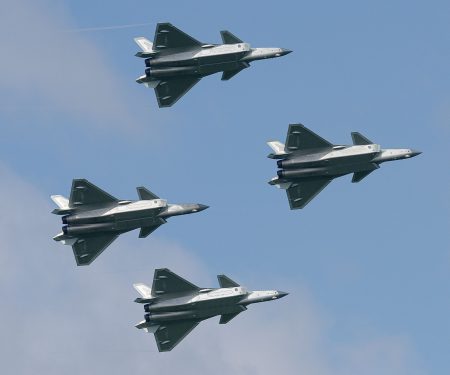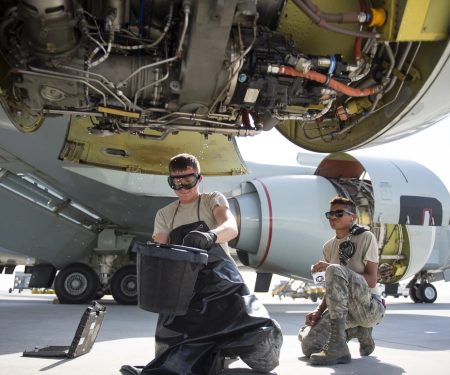Radar Sweep
Putin Says He Won’t Start a War with NATO. But Western Bases Hosting Ukraine F-16s Would Be Targets
Russian President Vladimir Putin scoffed at the possibility of his country launching an attack on a NATO member, calling it “sheer nonsense,” but warned that any Western air base hosting U.S.-made F-16 fighter jets that are slated for deployment in Ukraine would be a “legitimate target” for the Kremlin’s forces. “Their statements about our alleged intention to attack Europe after Ukraine is sheer nonsense,” Putin said late March 27, referring to warnings in the U.S. and Western Europe that Russia could turn its sights on other countries unless it’s stopped.
CENTCOM's Unfunded Priorities List Seeks $362M for Counter-Drone Mission, $44M for Maven
U.S. Central Command has sent Congress an unfunded priorities list that identifies an unmet need for $362 million in spending to counter unmanned aerial systems, according to a new document obtained by Inside Defense. An earlier UPL document obtained by Inside Defense and signed by Gen. Michael Kurilla, chief of CENTCOM, did not identify specific program needs. “C-UAS capabilities are the top USCENTCOM priority,” according to a breakdown.
Sentinel Flight Test Delayed More Than Two Years
The U.S. Air Force’s new intercontinental ballistic missile won’t have its first flight test until February 2026, documents show, putting the costly program further behind schedule. The new date is a significant delay from last year’s budget documents, which put the LGM-35A Sentinel ICBM program’s first flight test at December 2023.
Hermeus Rolls Out New Uncrewed Aircraft as Company Edges Toward Goal of Hypersonic Flight
Hermeus unveiled its new high-speed, jet-powered Quarterhorse Mk 1 aircraft March 28, taking another small step toward the Atlanta-based startup’s goal of producing the world’s first reusable hypersonic plane. The uncrewed Mk 1 aircraft is set to become the first Hermeus-produced aircraft to take to the skies during flight tests at Edwards Air Force base scheduled later this year, which are aimed at proving it can safely conduct high-speed take off and landings.
Northrop Says Air Force Design Changes Drove Higher Sentinel ICBM Cost
A Northrop Grumman official on March 25 attributed the explosive projected cost growth of the U.S. Air Force’s next intercontinental ballistic missile to the service’s design changes, including to the nuclear missile’s silo and connecting cables. The Air Force’s original plan for modernizing its ICBM enterprise included keeping nearly all its existing copper cabling in place to be reused for the upcoming LGM-35A Sentinel. That’s roughly 7,500 miles’ worth of copper cabling, connecting 450 half-century-old Minuteman III ICBM silos scattered through the Great Plains region with launch control centers and other facilities.
Troops Still Aren't Getting Enough Sleep, and the Defense Department Isn’t Taking Responsibility, Watchdog Says
Service members still aren’t getting enough sleep, in large part because there’s no coherent Pentagon effort to remedy the problem, according to a new report by the Government Accountability Office released this week. The GAO found that fatigue among service members “appeared to be more the rule than the exception,” with Active-Duty troops sleeping less than seven hours nightly twice as often as civilians. That lack of sleep has contributed to safety mishaps, near-misses, and numerous deaths.
DOD in Early Talks to Fund a Peacekeeping Force in Gaza
Biden administration officials are in preliminary “conversations” about options for stabilizing post-war Gaza, including a proposal for the Pentagon to help fund either a multinational force or a Palestinian peacekeeping team. The options being considered would not involve U.S. troops on the ground, according to two Defense Department officials and two other U.S. officials. ... Instead, DOD funding would go toward the needs of the security force and complement assistance from other countries.
New DOD Strategy Aims to Improve Contractors’ Cybersecurity, Resiliency
To protect military contractors from adversary cyber attacks, the Defense Department must commit to educating, measuring and driving improvements in the cybersecurity and resiliency of the industrial base, according to new strategic guidance from the Pentagon.
US Leaders Promise Security for Gaza Dock Mission amid Threat Concerns
Joint Chiefs Chairman Gen. CQ Brown said he is confident that U.S. troops working to provide humanitarian aid to residents of Gaza will be protected from violence in the region. Brown’s comments come amid concerns from Senate Republicans that the mission could cost American military lives.
How Marine MQ-9s Will Adapt for a Pacific Fight, Pave Way for Future Drones
Operational Test and Evaluation Squadron One (VMX-1), the specialized Marine Corps unit tasked with operationalizing innovations for the service's air arm, is about to receive two MQ-9 Reapers. The addition of the combat-proven drones into VMX-1's diverse stable will allow the squadron to deliver new capabilities to the Marine Air-Ground Task Force (MAGTF) and improve the ways the service's existing MQ-9s can be used in future high-end conflicts. It will also work to pave the way to an increasingly uncrewed future for the Corps.
US Joins Austria, Bahrain, Canada, & Portugal to Co-Lead Global Push for Safer Military AI
Delegates from 60 countries met last week outside D.C. and picked five nations to lead a yearlong effort to explore new safety guardrails for military AI and automated systems, administration officials exclusively told Breaking Defense. “Five Eyes” partner Canada, NATO ally Portugal, Mideast ally Bahrain, and neutral Austria will join the U.S. in gathering international feedback for a second global conference next year, in what representatives from both the Defense and State Departments say represents a vital government-to-government effort to safeguard artificial intelligence.
UK RAF Seeking More Advanced Autonomous Collaborative Platforms
The UK Royal Air Force (RAF) is hoping to field an attritable autonomous collaborative platform (ACP) to operate and provide mass to its combat aircraft fleets by 2030, the service’s new strategy has outlined. The service has already developed and advanced disposable systems–defined as Tier 1 ACPs–for intelligence, surveillance, and reconnaissance, electronic warfare, or acting as decoys, and it plans to declare such a capability operational as early as next year.
National Air Force Museum Prepares Eclipse Event for Up to 30K
The National Museum of the U.S. Air Force said that it is preparing for as many as 30,000 visitors to view the total solar eclipse on Monday, April 8. The museum’s Special Events Coordinator Taylor Gentry that the museum is preparing a family-friendly day, with events like a hot air balloon launch, rocket launches, a raffle, story for children and education about eclipse science.




